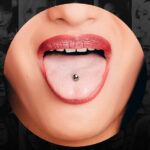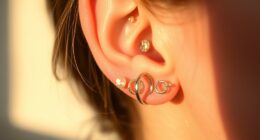Individuals who have tongue piercings are not the only ones concerned about potential pain post-procedure. This article explores various factors that could impact your piercing experience.
Tolerance to pain
Getting your tongue pierced is not an unpleasant event, but the aftermath can be painful. Here are some tips on how to avoid pain after getting your tongue pierced.

You may have heard of “tongue-piercing,” but what exactly is it? It involves inserting a needle through your tongue’s muscles and blood vessels.
Depending on your type of tongue piercing, the pain may be mild or intense. A small amount of swelling may also occur. If you have severe swelling, you might need to seek medical attention.
Professionals will be able to avoid complications if your tongue piercing was done properly. You may need to change your eating habits and oral care products. You may also want to get a new toothbrush and floss. It is also a good idea to get a flu shot.
Depending on your pain tolerance, you may be able to get away with only taking ibuprofen or paracetamol. These pain killers should be taken in small doses every few hours. They should be gradually decreased after a few days.
Changes in your eating habits are another way to reduce pain. Avoid acidic foods and crunchy foods that can irritate the mouth. Avoid hot and cold foods. Liquid food at room temperature is best for healing.
You should also avoid smoking. Smoking inhibits circulation, which can make your tongue piercing more susceptible to infection. It is also a good idea to use a mouthwash that is not alcohol-based. Most drug stores will carry alcohol-free mouthwash.
The most important part of your tongue piercing aftercare plan is to be sure to follow the directions. If you do not follow the instructions, your piercing may become infected or difficult to remove. You should immediately seek medical attention if you have a fever, enlarged lymph nodes or pus.
Remember to clean your tongue piercing every day with water and to follow your piercer’s aftercare instructions. These guidelines will speed up the healing process of your tongue piercing.
Infections due to certain jewelry materials
Using certain jewelry materials can cause infections in tongue piercings. While not dangerous in most cases, infections can be painful and lead to a number of complications.
An infection can cause the piercing to swell and block the airway. This can make it difficult to eat, talk, and swallow. You can treat a mild infection at home. More serious infections will require medical attention.
Infections can cause a red, irritated skin rash. In some cases, it may cause scar tissue to grow. An infection can also be characterized by pain, swelling, and a slight discharge. If the infection becomes severe, a prescription steroid cream or oral steroids may be required.
If you think your piercing may be infected, it is important to seek medical attention right away. Infected piercings can cause pain, swelling, and numbness. In rare cases, the infection can spread to the lymph nodes or milk ducts.
Tongue piercings can be more easily infected than any other body piercings. This is because the mouth is a moist environment that is ideal for bacteria to grow. Tongue jewelry can also cause irritation and pain by hitting teeth with it.
An allergic reaction can also be caused by certain cleaning products. Sometimes, the allergic reaction can occur immediately after cleaning. To prevent an allergic reaction, choose a cleaning solution that is appropriate for your jewelry.
An infected piercing may be red and swollen. It may also produce a white discharge. It may appear warm or clear. It is normal for the piercings to bleed at first. However, it should not become red or swollen over time.
Use certain cleaning products with care. Rinse thoroughly. Alcohol-based rinses can irritate the piercing and prolong the healing process. Instead, use an alcohol-free mouthwash.
Drinking and eating can also cause infection. Food can be contaminated with bacteria from the mouth, which can be transferred to the piercing through contact with other fingers. Foods that are crunchy or spicy can also increase irritation.
You can prevent these infections from occurring by choosing the right jewelry and using proper hygiene. Also, make sure you wear a mouthguard whenever you participate in contact sports.
Unlicensed piercers can cause infection
Tongue piercing has been linked to several infections. The infection may be localized to the mouth or may involve other organs such as the heart or brain. These infections can be very serious. However, the presence of these infections is rare.
A literature review revealed that tongue piercing was associated with 18 cases of bacterial infection. Tables 1 & 2 summarize the clinical features of these cases.
Six of these 18 cases were related to Ludwig’s angina. This is a type bacterial infection of your mouth floor. It is caused when bacteria travels from the mouth to the bloodstream. It can lead to heart failure.
Infective endocarditis, which is a third type of bacterial infections, was linked to tongue piercing. It is caused when bacteria travels through the piercing hole into your bloodstream. It is associated with congenital heart disease and can cause serious heart damage. Infective endocarditis is a life threatening infection.
Several factors contribute to the risk of developing bacterial infections after piercing. These factors include ongoing trauma to the mouth, the presence or oral bacteria, and infection control techniques surrounding the procedure.
The risk of developing an infection is increased if the person does not follow aftercare instructions provided by the piercer. Before touching their mouth, the patient should wash their hands. They should also avoid spicy foods and crunchy foods. They should keep up a daily cleaning routine until the symptoms disappear. They should avoid hot drinks, as well as alcohol-based mouthwashes. They should also avoid oral sex.
Also, piercings can transmit blood-borne diseases like HIV, herpes simplex virus and hepatitis B. They also increase the risk of dental injury. Kissing can also transmit bacteria and saliva.
Piercings are also a risk factor for gingival recession and mucosal inflammation. The nerves in your mouth can also be damaged by piercings. Fortunately, infections associated with tongue piercing are rare. However, physicians should be aware of these risks and implement measures to prevent them.
Piercings should be conducted by licensed professionals. Piercers should be required to follow standardized infection prevention practices.
Longevity of the piercing
Of all the piercings available, tongue piercings is the most delicate and sensitive. It is therefore important to know what the risks are for tongue piercings. Also, it is crucial to know what to do to help prevent complications and the longevity of tongue piercings.
The authors conducted a study to determine the long-term effects on tongue piercings. 1,884 people were interviewed. The subjects were asked to volunteer for the study. They were asked to complete a questionnaire about their education, age, and oral hygiene habits. They also answered questions about their dental trauma, piercing artist, and material used for piercing.
The results showed that people with tongue piercings were at greater risk of enamel cracks or fissures. They also had a higher risk of lingual recessions. This result is a concern since they are often associated with gingival recessions.
Another study looked at the long-term effects tongue ring piercings had on the body. It included male participants, as well as German soldiers. The study used a matched-pair approach. The subjects were paired with randomly chosen male subjects who did not have tongue piercings. The Ethics Committee of Federal Ministry of Defence approved the study.
The study found that tongue piercings last less time than expected. A larger, stretched hole might close in a few days while a smaller one may take several weeks. The study also showed that a thick film on the tongue may encourage bacterial growth.
In addition to the risks mentioned above, tongue piercings also have the potential to break porcelain and metal crowns. A piercing may also cause fractures depending on the angle or portion of the tongue.
In addition to the obvious dangers associated with tongue piercings they can also cause discomfort and soreness. They can also delay the healing process. To heal completely, it can take up to four to eight weeks.
It is important to take care of your tongue piercing and avoid using substances that irritate it, including alcohol, acidic foods, and spicy foods. You may also need to make lifestyle changes. For example, avoid eating spicy foods, crunchy foods, and dairy products.
















